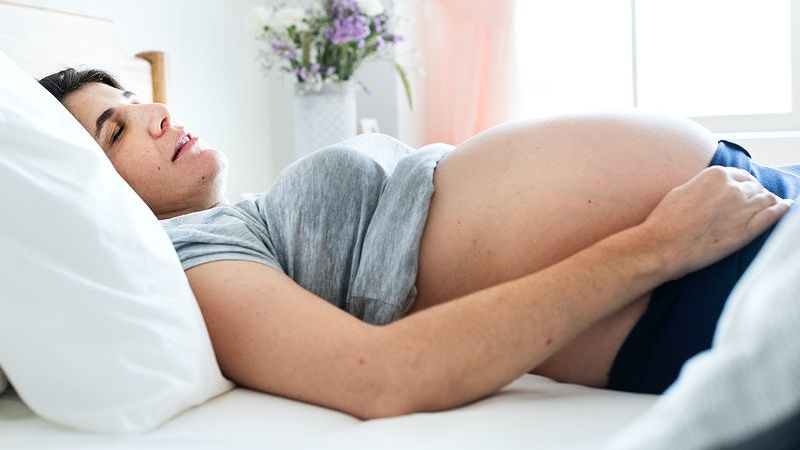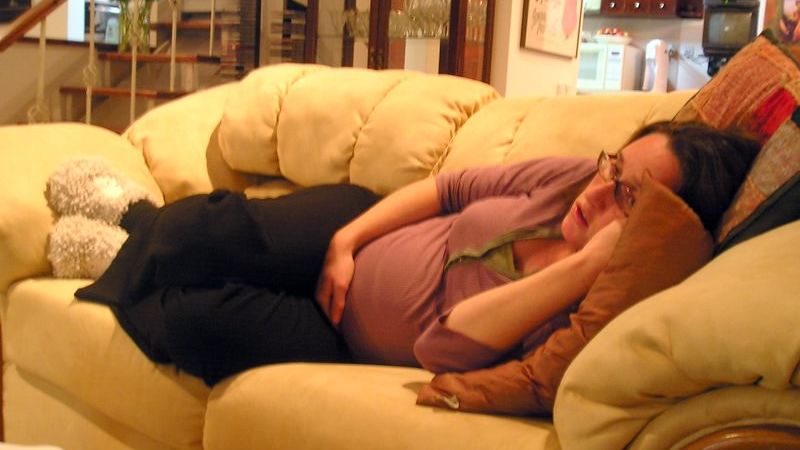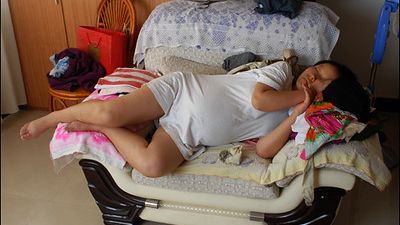Sleep (Insomnia)

A lack of sleep is almost a given for most pregnant women, especially in the third trimester. However, pregnant women can begin losing sleep as early as the first few weeks; loss of sleep usually continues to get worse as pregnancy progresses.
Although some health care providers (HCP) may dismiss it as simply a part of pregnancy, research continues to further identify the negative effects of sleep deficiency during pregnancy. It is becoming more clear just how important adequate sleep is for the health of both mother and baby, a safe delivery, and a happy postpartum period.
There are many, many reasons why women may be getting less sleep during pregnancy, and by talking with their HCP, women can identify the possible causes and begin to manage sleep as early as possible to prevent any potential associated complications.
Background
A lack of sleep is very common during pregnancy. This has lead some HCPs to potentially dismiss it as just “one of those things” of pregnancy – despite almost 25% of women losing sleep as early as the first trimester (only to get worse). By the end of pregnancy, almost all women are waking up at night for longer periods of time.
Sleep deficiency: inadequate amount of sleep, with normal sleep outside pregnancy being 7 to 9 hours of sleep a night
Sleep efficiency: the ratio of total sleep time to time in bed (i.e. spending too much time in bed trying to fall sleep)
Insomnia: defined both as a symptom and as a disorder; difficulty initiating or maintaining sleep, waking from sleep too early, and/or nonrestorative sleep
Sleep hygiene: healthy sleep habits that improves someone’s ability to fall asleep and stay asleep
A lack of sleep is not necessarily “self-limiting”, as it does not necessarily get better after delivery. Therefore, managing sleep problems and providing information to women about how they can talk to their HCP about their lack of sleep can prevent complications during and after pregnancy.

Causes – Overview
Most studies suggest there is an increased need for sleep during pregnancy based on early metabolic requirements. Additionally, the high levels of HCG and progesterone that are necessary to maintain pregnancy promote “sleepiness” so a woman is likely to rest more. (Conversely, the progesterone drop in late pregnancy may be the reason for women’s sudden energy bursts, or "nesting", near delivery.)
This has been described as a paradox of pregnancy: despite the need for healthy sleep and the body's attempt to promote it, so many other changes and symptoms of pregnancy make achieving adequate rest impossible.
If a pregnant woman is waking up very tired, and finds herself falling asleep during the day, she should assess the below detailed possible causes and talk to her HCP.
Causes – Detailed
Poor sleep during pregnancy can be caused by many different factors; some women may experience several at time, while others may experience only one factor, but still significant enough to cause a loss of good, quality sleep.
Fatigue: Fatigue is a frequent, persistent complaint during pregnancy. Fatigue leads to mental exhaustion, poor cognitive performance, depressive symptoms, and is not always improved with rest; physical exercise is often recommended to combat daytime fatigue and improve nighttime sleep.
NVP : Nausea and Vomiting of Pregnancy (NVP), commonly known as “morning sickness”, can debilitate a woman’s ability to sleep, especially in the first trimester. NVP can occur any time of day, and a lot of women have nausea that begins in the evening and lasts all night. Further, women with nighttime nausea cannot catch up on sleep during the day, due to employment/parenting and other responsibilities (read Evening and Overnight Nausea).
Night Eating: Women who eat at night, especially those who eat to combat morning/evening nausea can lose sleep. Further, eating a late night snack or a spicy/greasy meal during the early evening can cause acid reflux and heartburn, which can awaken women at night.
Heartburn: Up to 80% of pregnant women experience heartburn symptoms; the vast majority of these will have heartburn symptoms severe enough to affect their sleep – largely in the third trimester.

Frequent urination: Needing to urinate at night (nocturia) accounts for the majority of nighttime awakenings during the second and third trimesters; compression of the bladder from the growing uterus decreases the amount of urine the bladder can hold before a woman feels the urge to urinate.
Sweating: Excessive sweating can affect several aspects of a pregnant woman’s life, leading to frequent clothing changes, increased antiperspirant use, frequent bed sheet changes, and disrupted sleep.
Restless leg syndrome (RLS): RLS is characterized as an irresistible urge to move the legs, especially when trying to fall asleep, and could be accompanied by other symptoms such as an aching feeling; all complications associated with RLS are related to a lack of sleep, which is the direct result of the condition.
Itching: Itching can be extremely frustrating for pregnant women, causing significant irritation, restlessness, and trouble sleeping.
Nasal Congestion: Nasal congestion starts early in the first trimester as blood volume begins to increase significantly which causes more fluid to flow through the small capillaries in the nose. This leads to “stuffiness” that tends to get worse at night and while lying down; nasal congestion also leads to mouth breathing, which can cause additional sleep problems.
Snoring: Reportedly as high as 35% of all pregnant women, most of whom did not snore prior to pregnancy. Snoring, usually a direct result of nasal congestion, is associated with an increased risk of sleep apnea, preeclampsia, gestational diabetes, and cesarean delivery – mostly due to complications associated with mouth breathing.
Obstructive sleep apnea (OSA): OSA is a breathing-related sleep disorder characterized by repeated episodes of apnea (cessation of breathing) or hypopnea (decrease in the flow of breathing accompanied by oxygen desaturation) secondary to nasal congestion; an estimated 1% to 25% of pregnant women may suffer with obstructive sleep apnea, which has also been linked to preeclampsia.
Breathing during pregnancy can also be obstructed due to certain respiratory changes, excess weight, and/or pressure from the growing uterus when a woman attempts to lie flat on her back to sleep, which should be avoided.
Position: Women are advised not to lie flat on their backs or stomachs during pregnancy; therefore, some women must train themselves to sleep in entirely new positions (side sleeping, etc.) to fall asleep.

Physical discomfort: Discomfort is the most common and significant cause of a lack of sleep during pregnancy; most of the physical changes of pregnancy (sore breasts, large uterus, loose joints, sore back, sweating, heartburn) make finding a comfortable position to sleep very difficult.
High Body Mass Index: Meta-analyses published in July 2021 revealed that the risk of sleep apnea, habitual snoring, short sleep duration and poor sleep quality is increased in pregnant women with high body mass index.
Fetal movement: Fetal movements become organized between 20 and 30 weeks of pregnancy and the fetus starts to show sleep-awake (or rest-activity) cycles that have no bearing on the mother’s own sleep pattern; some fetuses can be very active at night, making it difficult for some women to fall asleep and stay asleep.
Bed Rest: Bed Rest is a traditional method used by HCPs all over the world to avoid various pregnancy-related complications that could be affected by a woman’s level of physical activity. However, research since the 1980s has shown that bed rest is not effective at preventing any pregnancy-related complications and women who remain on bed rest for a prolonged period have a significant trouble sleeping.
Anxiety and Stress: Anxiety and stress are both very common and may be further amplified by concerns about labor and delivery as well as parenting; various pregnancy-related stresses and concerns can promote an inability to sleep.
Nightmares: It is estimated that about 6% to 10% of pregnant women report severe nightmares related to a fear of childbirth which cause them to lose sleep closer to term.
Braxton Hicks: Braxton Hicks contractions are "false" contractions that occur more frequently around the beginning of the third trimester to term. Braxton Hicks contractions can be triggered by dehydration, stress, a full bladder, and/or a lack of sleep. They can also occur as a woman settles down into bed, preventing the woman from falling asleep.
Complications
Specific complications of pregnancy that arise from a lack of sleep occur due to inflammation.
Sleep deprivation is linked with an increased inflammatory response, an assessed biological pathway through which certain conditions develop, such as gestational hypertension and preeclampsia, as well as longer labor and need for cesarean delivery. A lack of sleep is also linked to postpartum depression and other complications:
A study published in November 2020 determined that shorter sleep duration and poorer sleep efficiency during pregnancy were associated with higher blood pressure, especially in the first trimester.
A study published in October 2021 determined that pregnant women who experience an extreme lack of sleep (4 hours/day) had a significantly higher risk of preterm birth than those who slept normally.
Management
It is recommended that women attempt to determine the cause(s) for their lack of sleep during pregnancy, and HCPs can help. Women should talk to their HCP early in pregnancy about all sleep related matters, so that any potential negative habits can be avoided and possible complications can be prevented.
Most causes of sleep deprivation in pregnancy are relieved after delivery; however, the postpartum period brings new reasons to be sleep deprived, therefore women need to stay on top of the management of their sleep as early as possible during pregnancy.
Lifestyle modifications are highly recommended before any medication use during pregnancy (see Action). If women try these various methods and are still experiencing a dramatic lack of sleep, their HCP may recommend medication. As of 2011, it was reported that up to 4.5% of pregnant women use sleep medications.
Antihistamines and benzodiazepines (alprazolam, clonazepam, diazepam, lorazepam, and temazepam) produce a sedative effect and are the most prescribed sleep medications during pregnancy; these medications do cross the placenta and may affect the fetus.
Although data is limited, no adverse effects have been reported, but neonatal withdrawal is possible with the use of benzodiazepines, as well as “floppy infant syndrome” in women taking some of these drugs long-term. An increased risk for small-for-gestational-age and preterm delivery has also been reported.
Based on the limited safety data regarding these medications during pregnancy, women should have a risks and benefits discussion with their HCP. In women with extreme insomnia, the risks of taking medication may outweigh the risks of continued loss of sleep.
Any medication should be taken in the lowest effect dose for the shortest amount of time to further eliminate any possible risks to the fetus.
A study published in July 2021 determined that cognitive behavioral therapy may also be beneficial. Compared to controls, women who received CBT had lower insomnia severity and sleep disturbance and lower sleep-related impairment at the pregnancy endpoint, as well as at 24 months postpartum.
CBT is a form of therapy based on the relationships among cognition, emotion, and behavior (how an individual reacts and perceives a situation or event, and changing that perception). CBT can improve mood, lower stress, and improve overall mental health.
Action
Women should talk to their HCP regarding any sleep concerns they have during pregnancy. HCPs can help women manage any symptoms/conditions they may be experiencing that could be causing their inability to sleep.

If medically cleared, women should engage in physical exercise at least 30 minutes every day (not in the evening) which may help improve their ability to sleep.
Pregnant women should also:
Try a sleep mask
Make their bedroom as comfortable as possible
Take daytime naps early in the day
Avoid staring at the clock, counting hours, or panicking about not getting sleep
Avoid excess fluid intake near bedtime, as well as caffeine and nicotine
Avoid spicy, heavy and fried foods to decrease acid reflux and heartburn
Women should try to get as comfortable as possible by managing any pain, swelling, or discomfort they are experiencing through massage, heating pads, pillows, temperature control, or medications (as directed by an HCP).
If a woman is able to find a pillow that works, especially if not a specific maternity pillow, she should put her own colored pillowcase on it, so no one else in the household takes it or moves it.
Progressive muscle relaxation is a form of relaxation therapy which includes alternately tightening and relaxing different muscles (see Resources). Abdominal deep breathing, meditation, and relaxing thoughts can also be helpful.
Autonomous Sensory Meridian Response (ASMR) can be described as relaxing, tingling sensations in the crown of the head, in response to specific audio-visual triggers such as whispering, tapping, brushing hair, watching someone paint or apply make up, or doing a normal daily activity in a controlled environment (read more).
Many YouTube videos exist that are easily accessible, include a wide range of ASMR-inducing stimuli, and can be viewed prior to bed time to help the body and mind relax.
Sleep Hygiene
"Sleep hygiene" is a term used to describe various habits that promote better sleep; these habits can also include those described above.
Sleep efficiency is computed as time asleep divided by time in bed. The goal is to avoid too much time in bed before the body is able to fall asleep.
It is assessed that healthy adults should fall asleep within 5 to 10 minutes, obtaining at least 7 full hours.
The first step toward sleep efficiency is to avoid lying in bed for extended periods of time prior to bedtime, as well as avoiding going to bed until tired.
Women should try to establish regular sleep-wake cycles, and attempt to wake up and go to bed at the same time every day.
Women should also avoid activities like eating, watching television, playing on devices, or having lengthy cell phone calls while in bed.
Women should also consider sharing and submitting their experience below regarding sleep during pregnancy. This can help other women learn additional perspectives regarding this concern and how to potentially obtain better sleep.
Partners/Support
Partners/support members can have a major impact on a pregnant woman's ability to sleep. Proper understanding may be the first place to start.
It is very difficult to get comfortable as the uterus continues to grow. Women have very few positional options, and this can result in back and shoulder pain, and decrease the quality of sleep women can obtain each night.
Women can no longer sleep on their stomachs, and most women can no longer sleep on their backs. This results in side sleeping, which requires physical support of the spine, uterus, breasts, hips, and legs to feel any sense of comfort.
HCPs will need to know if women begin snoring, experiencing nightmares, or exhibiting signs or symptoms of possible obstructive sleep apnea or acid reflux/heartburn. These symptoms can overlap and include snoring, choking sounds, coughing, gagging, and/or gasping, as well as the appearance of possible gaps in breathing.
Resources
Sleep Education (American Academy of Sleep Medicine)
Pregnancy search query (SleepFoundation.org)
Stress Management: Doing Progressive Muscle Relaxation (Michigan Medicine, University of Michigan)